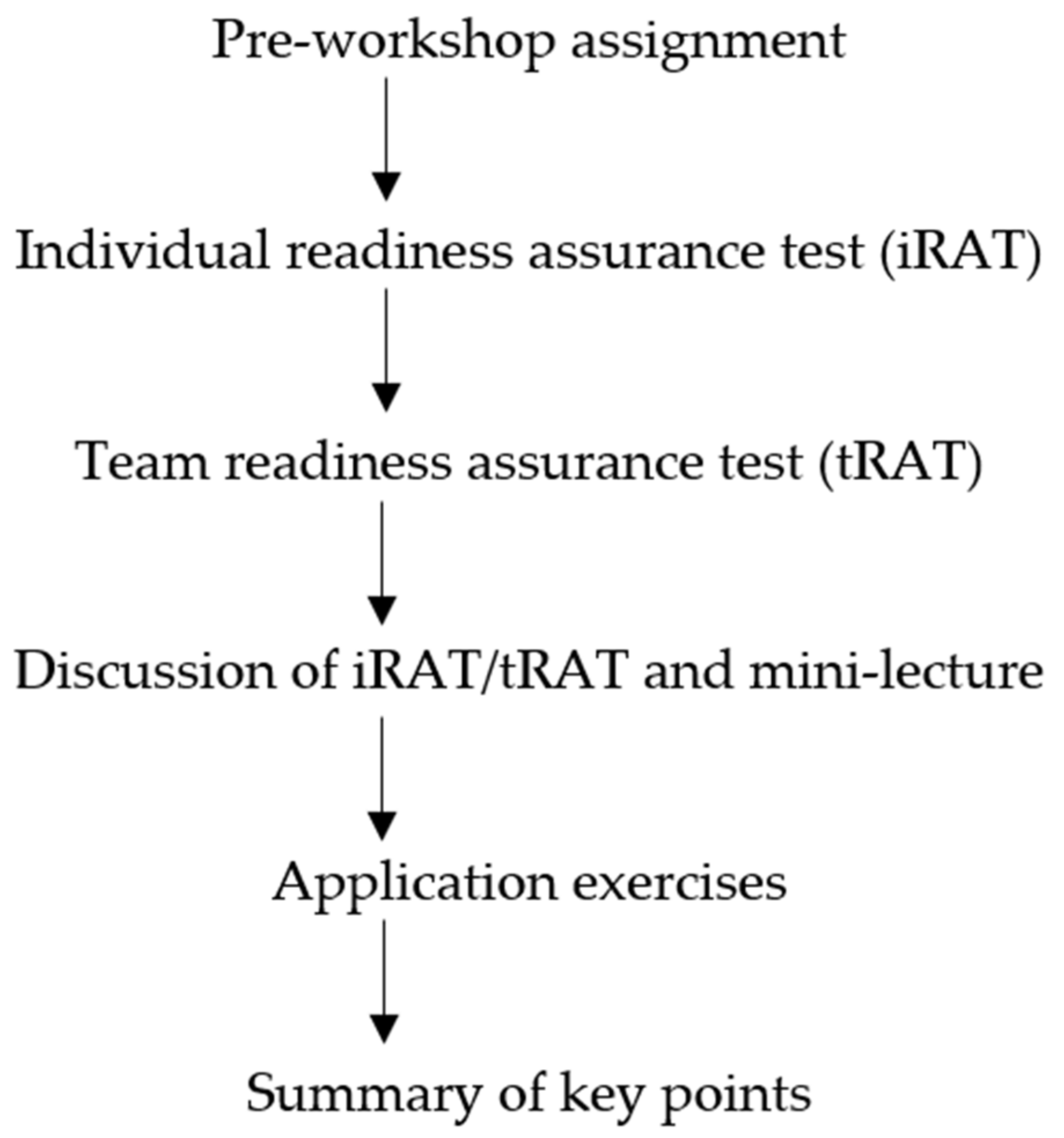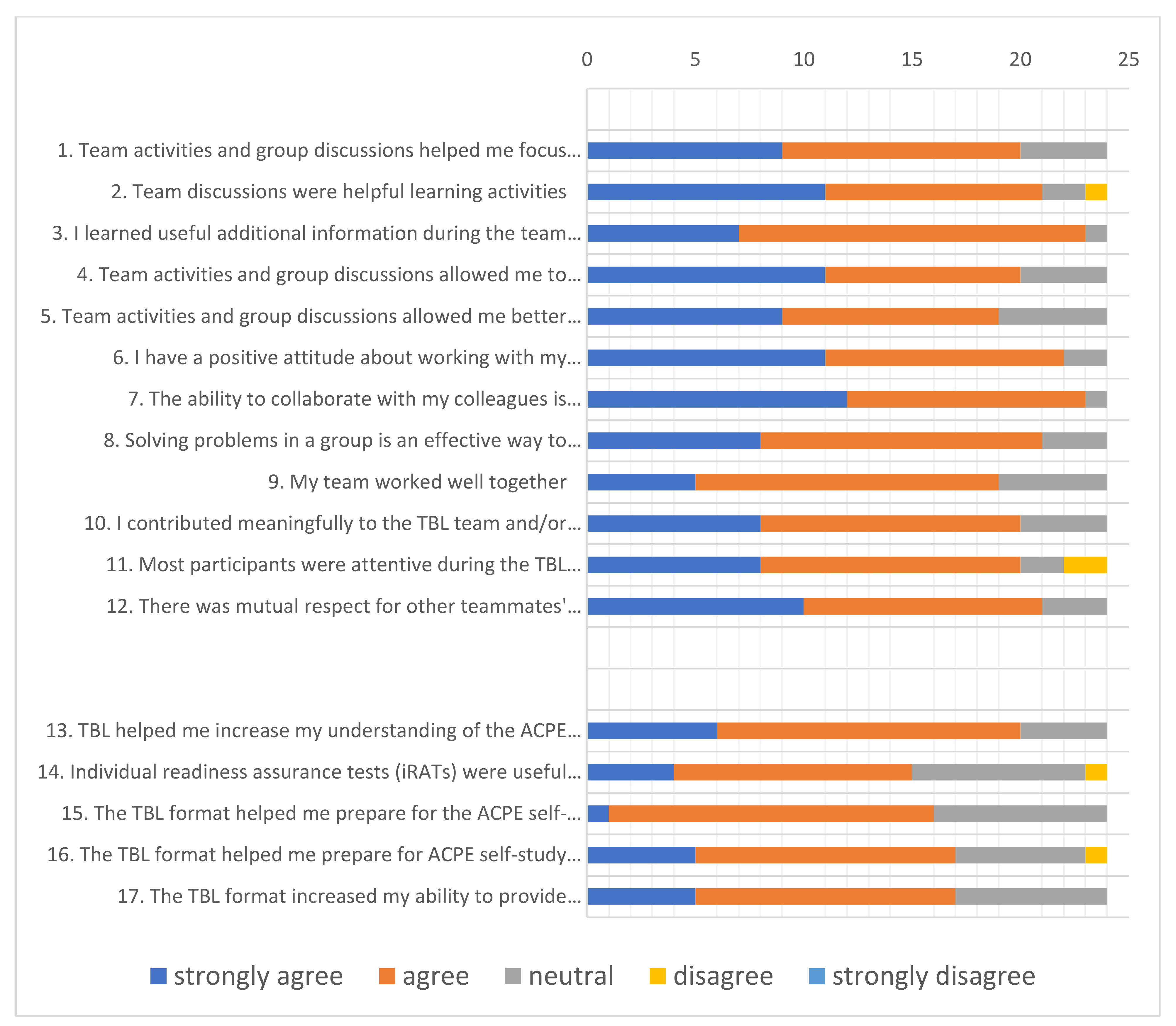Use of Team-Based Learning Pedagogy to Prepare for a Pharmacy School Accreditation Self-Study
Abstract
1. Introduction
2. Materials and Methods
2.1. Research Participants
2.2. Overview of the Use of Team-Based Learning Pedagogy within the Accreditation Self-Study Training Workshop
2.3. Survey Administration and Data Collection
2.4. Data Analyses
3. Results
3.1. Responses to Questions Relating to Participant Engagement and Usefulness of Team Activities
3.2. Responses to Questions Relating to the TBL Format
3.3. Study Limitations
4. Discussion
Author Contributions
Funding
Institutional Review Board Statement
Informed Consent Statement
Acknowledgments
Conflicts of Interest
References
- Frank, J.R.; on behalf of the International Health Professions Accreditation Outcomes Consortium; Taber, S.; Van Zanten, M.; Scheele, F.; Blouin, D. The role of accreditation in 21st century health professions education: Report of an International Consensus Group. BMC Med. Educ. 2020, 20, 305. [Google Scholar] [CrossRef]
- Global Forum on Innovation in Health Professional Education, Board on Global Health, Health and Medicine Division, National Academies of Sciences, Engineering, and Medicine. Exploring the Role of Accreditation in Enhancing Quality and Innovation in Health Professions Education: Proceedings of a Workshop; National Academies Press: Washington, DC, USA, 2016. Available online: https://www.ncbi.nlm.nih.gov/books/NBK435965/ (accessed on 8 October 2020).
- Preaccredited and Accredited Professional Programs of Colleges and Schools of Pharmacy. Available online: https://www.acpe-accredit.org/pharmd-program-accreditation/ (accessed on 8 October 2020).
- LCME Accreditation. Available online: https://www.aamc.org/services/first-for-financial-aid-officers/lcme-accreditation (accessed on 8 October 2020).
- American Association of Colleges of Nursing. Standards, Procedures and Guidelines. Available online: https://www.aacnnursing.org/CCNE-Accreditation/Accreditation-Resources/Standards-Procedures-Guidelines (accessed on 8 October 2020).
- Vlasses, P.H.; Engle, J.P.; Wadelin, J.W.; Boyer, J.G.; Travlos, D.V.; Rouse, M.J.; Avery, C. Accreditation Council for Pharmacy Education: 2019 Annual Report. Am. J. Pharm. Educ. 2020, 84, 8222. [Google Scholar] [CrossRef]
- Cheramie, K.V. Lessons in Writing a Self-Study. J. Contin. Educ. Nurs. 2014, 45, 377–378. [Google Scholar] [CrossRef]
- Hunt, D.; Migdal, M.; Waechter, D.M.; Barzansky, B.; Sabalis, R.F. The Variables That Lead to Severe Action Decisions by the Liaison Committee on Medical Education. Acad. Med. 2016, 91, 87–93. [Google Scholar] [CrossRef] [PubMed]
- U.S. Department of Education. State Contacts. Available online: https://www2.ed.gov/about/contacts/state/index.html (accessed on 8 October 2020).
- California Department of Education. County Office of Education—CalEdFacts. Available online: https://www.cde.ca.gov/SchoolDirectory/county-offices-of-education (accessed on 8 October 2020).
- Phillips, C.; Chesnut, R.; Haack, S.; Rospond, R.; Schirmer, L.; Schott, K.; Soltis, D.; Torry, R. Garnering Widespread Involvement in Preparing for Accreditation Under ACPE Standards 2007. Am. J. Pharm. Educ. 2010, 74, 30. [Google Scholar] [CrossRef] [PubMed]
- Timpe, E.M.; Gupchup, G.V.; Scott, V.G.; Cobb, D. Incorporating a Continuous Quality Improvement Process into Pharmacy Accreditation for Well-Established Programs. Am. J. Pharm. Educ. 2012, 76, 38. [Google Scholar] [CrossRef]
- Evans, R.L.; Duncan, W.; Jungnickel, P.W. Incorporating ACPE Standards in a Holistic Approach to School Operations and Accreditation. Am. J. Pharm. Educ. 2019, 83, 7073. [Google Scholar] [CrossRef] [PubMed]
- Allen, R.E.; Copeland, J.; Franks, A.S.; Karimi, R.; Mccollum, M.; Riese, D.; Lin, A.Y. Team-Based Learning in US Colleges and Schools of Pharmacy. Am. J. Pharm. Educ. 2013, 77, 115. [Google Scholar] [CrossRef] [PubMed]
- Silberman, D.; Carpenter, R.; Takemoto, J.K.; Coyne, L. The impact of team-based learning on the critical thinking skills of pharmacy students. Curr. Pharm. Teach. Learn. 2021, 13, 116–121. [Google Scholar] [CrossRef] [PubMed]
- Persky, A.M. The Impact of Team-Based Learning on a Foundational Pharmacokinetics Course. Am. J. Pharm. Educ. 2012, 76, 31. [Google Scholar] [CrossRef]
- Sharma, A.; Janke, K.K.; Larson, A.; Peter, W.S. Understanding the early effects of team-based learning on student accountability and engagement using a three session TBL pilot. Curr. Pharm. Teach. Learn. 2017, 9, 802–807. [Google Scholar] [CrossRef] [PubMed]
- Rotgans, J.I.; Schmidt, H.G.; Rajalingam, P.; Hao, J.W.Y.; Canning, C.A.; Ferenczi, M.; Low-Beer, N. How cognitive engagement fluctuates during a team-based learning session and how it predicts academic achievement. Adv. Heal. Sci. Educ. 2018, 23, 339–351. [Google Scholar] [CrossRef]
- Hazel, S.J.; Heberle, N.; McEwen, M.-M.; Adams, K. Team-Based Learning Increases Active Engagement and Enhances Development of Teamwork and Communication Skills in a First-Year Course for Veterinary and Animal Science Undergraduates. J. Veter. Med. Educ. 2013, 40, 333–341. [Google Scholar] [CrossRef]
- Burgess, A.; Haq, I.; Bleasel, J.; Roberts, C.; Garsia, R.; Randal, N.; Mellis, C. Team-based learning (TBL): A community of practice. BMC Med. Educ. 2019, 19, 369. [Google Scholar] [CrossRef]
- Haidet, P.; Kubitz, K.; McCormack, W.T. Analysis of the Team-Based Learning Literature: TBL Comes of Age. J. Excel. Coll. Teach. 2015, 25, 303–333. [Google Scholar]
- Freeman, S.; Eddy, S.L.; McDonough, M.; Smith, M.K.; Okoroafor, N.; Jordt, H.; Wenderoth, M.P. Active learning increases student performance in science, engineering, and mathematics. Proc. Natl. Acad. Sci. USA 2014, 111, 8410–8415. [Google Scholar] [CrossRef]
- Persky, A.M.; Pollack, G.M. Using answer-until-correct examinations to provide immediate feedback to students in a pharmaco-kinetics course. Am. J. Pharm. Educ. 2008, 72, 83. [Google Scholar] [CrossRef] [PubMed][Green Version]
- Lein, D.H.; Lowman, J.D.; Eidson, C.A.; Yuen, H.K. Cross-validation of the Student Perceptions of Team-Based Learning Scale in the United States. J. Educ. Evaluation Heal. Prof. 2017, 14, 15. [Google Scholar] [CrossRef] [PubMed]
- Burgess, A.; Van Diggele, C.; Roberts, C.; Mellis, C. Team-based learning: Design, facilitation and participation. BMC Med. Educ. 2020, 20, 461. [Google Scholar] [CrossRef] [PubMed]
- McEwan, D.; Ruissen, G.R.; Eys, M.A.; Zumbo, B.D.; Beauchamp, M. The Effectiveness of Teamwork Training on Teamwork Behaviors and Team Performance: A Systematic Review and Meta-Analysis of Controlled Interventions. PLoS ONE 2017, 12, e0169604. [Google Scholar] [CrossRef]
- College of Pharmacy, University of Huston. Self-Study Report to the Accreditation Council for Pharmacy Education. January 2017. Available online: https://uh.edu/pharmacy/_documents/acpe/UHCOP_Self-Study_2017.pdf (accessed on 8 October 2020).
- ACPE Self Study Narrative Report. Available online: https://www.csu.edu/collegeofpharmacy/deanoffice/documents/Narrative_report.pdf (accessed on 8 October 2020).
- Jansen, T. A Team-Based Learning Adventure. Training Mag. 2018. Available online: https://trainingmag.com/a-team-based-learning-adventure/ (accessed on 8 October 2020).
- Vander Kooi, G.P.; Palmer, L.B. Problem-based Learning for Police Academy Students: Comparison of Those Receiving Such Instruction with Those in Traditional Programs. J. Crim. Justice Educ. 2014, 25, 175–195. [Google Scholar] [CrossRef]
- Burgess, A.; Bleasel, J.; Haq, I.; Roberts, C.; Garsia, R.; Robertson, T.; Mellis, C. Team-based learning (TBL) in the medical curriculum: Better than PBL? BMC Med. Educ. 2017, 17, 243. [Google Scholar] [CrossRef] [PubMed]
- Remington, T.L.; Bleske, B.E.; Bartholomew, T.; Dorsch, M.P.; Guthrie, S.K.; Klein, K.C.; Tingen, J.M.; Wells, T.D. Qualitative Analysis of Student Perceptions Comparing Team-based Learning and Traditional Lecture in a Pharmacotherapeutics Course. Am. J. Pharm. Educ. 2017, 81, 55. [Google Scholar] [CrossRef] [PubMed]


| Question Number | Question Text (Answer Options for All Questions ‘Strongly Agree’, ‘Agree’, ‘Neutral’, ‘Disagree’, or ‘Strongly Disagree’) |
|---|---|
| 1 | Team activities and group discussions helped me focus on important information |
| 2 | Team discussions were helpful learning activities |
| 3 | I learned useful additional information during the team activities and group discussions |
| 4 | Team activities and group discussions allowed me to correct misunderstandings |
| 5 | Team activities and group discussions allowed me to better understand the ACPE self-study process and materials |
| 6 | I have a positive attitude about working with my colleagues on the ACPE self-study process |
| 7 | The ability to collaborate with my colleagues is necessary for the ACPE self-study to be successful |
| 8 | Solving problems in a group is an effective way to prepare for the ACPE self-study process and voting |
| 9 | My team worked well together |
| 10 | I contributed meaningfully to the TBL team and/or group discussions |
| 11 | Most participants were attentive during the TBL session(s) |
| 12 | There was mutual respect for other teammates’ viewpoints during the TBL session(s) |
| 13 | TBL helped me increase my understanding of the ACPE self-study process and materials |
| 14 | Individual readiness assurance tests (iRATs) were useful learning activities |
| 15 | The TBL format helped me prepare for the ACPE self-study process |
| 16 | The TBL format helped me prepare for ACPE self-study voting |
| 17 | The TBL format increased my ability to provide meaning contributions to the ACPE self-study process |
Publisher’s Note: MDPI stays neutral with regard to jurisdictional claims in published maps and institutional affiliations. |
© 2021 by the authors. Licensee MDPI, Basel, Switzerland. This article is an open access article distributed under the terms and conditions of the Creative Commons Attribution (CC BY) license (https://creativecommons.org/licenses/by/4.0/).
Share and Cite
Vinall, R.; Malhotra, A.; Puglisi, J. Use of Team-Based Learning Pedagogy to Prepare for a Pharmacy School Accreditation Self-Study. Pharmacy 2021, 9, 148. https://doi.org/10.3390/pharmacy9030148
Vinall R, Malhotra A, Puglisi J. Use of Team-Based Learning Pedagogy to Prepare for a Pharmacy School Accreditation Self-Study. Pharmacy. 2021; 9(3):148. https://doi.org/10.3390/pharmacy9030148
Chicago/Turabian StyleVinall, Ruth, Ashim Malhotra, and Jose Puglisi. 2021. "Use of Team-Based Learning Pedagogy to Prepare for a Pharmacy School Accreditation Self-Study" Pharmacy 9, no. 3: 148. https://doi.org/10.3390/pharmacy9030148
APA StyleVinall, R., Malhotra, A., & Puglisi, J. (2021). Use of Team-Based Learning Pedagogy to Prepare for a Pharmacy School Accreditation Self-Study. Pharmacy, 9(3), 148. https://doi.org/10.3390/pharmacy9030148








